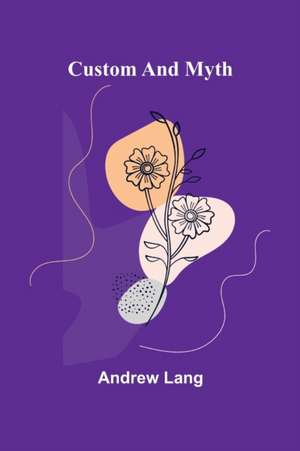Custom and Myth
Autor Andrew Langen Limba Engleză Paperback – 6 iun 2022
| Toate formatele și edițiile | Preț | Express |
|---|---|---|
| Paperback (13) | 39.13 lei 3-5 săpt. | |
| CreateSpace Independent Publishing Platform – | 39.13 lei 3-5 săpt. | |
| CREATESPACE – | 45.86 lei 3-5 săpt. | |
| CREATESPACE – | 46.61 lei 3-5 săpt. | |
| CreateSpace Independent Publishing Platform – 6 dec 2015 | 46.69 lei 3-5 săpt. | |
| CREATESPACE – | 47.28 lei 3-5 săpt. | |
| CreateSpace Independent Publishing Platform – | 51.38 lei 3-5 săpt. | |
| – | 64.68 lei 3-5 săpt. | |
| CREATESPACE – | 74.60 lei 3-5 săpt. | |
| CREATESPACE – | 109.47 lei 3-5 săpt. | |
| Hansebooks – 2 iun 2023 | 262.41 lei 3-5 săpt. | |
| Alpha Editions – 6 iun 2022 | 96.43 lei 6-8 săpt. | |
| Bibliotech Press – 14 iun 2020 | 105.24 lei 6-8 săpt. | |
| TREDITION CLASSICS – 31 oct 2011 | 181.22 lei 6-8 săpt. |
Preț: 96.43 lei
Nou
Puncte Express: 145
Preț estimativ în valută:
18.46€ • 19.19$ • 15.31£
18.46€ • 19.19$ • 15.31£
Carte tipărită la comandă
Livrare economică 06-20 februarie 25
Preluare comenzi: 021 569.72.76
Specificații
ISBN-13: 9789356230422
ISBN-10: 9356230420
Pagini: 182
Dimensiuni: 152 x 229 x 11 mm
Greutate: 0.27 kg
Editura: Alpha Editions
ISBN-10: 9356230420
Pagini: 182
Dimensiuni: 152 x 229 x 11 mm
Greutate: 0.27 kg
Editura: Alpha Editions
Notă biografică
Andrew Lang's Fairy Books-also known as Andrew Lang's "Coloured" Fairy Books or Andrew Lang's Fairy Books of Many Colors-are a series of twelve collections of fairy tales, published between 1889 and 1910. Each volume is distinguished by its own color. In all, 437 tales from a broad range of cultures and countries are presented. Andrew Lang (1844-1912) was a Scots poet, novelist, and literary critic. Although he did not collect the stories himself from the oral tradition, the extent of his sources, who had collected them originally-with the notable exception of Madame d'Aulnoy-made the collections immensely influential. Lang gave many of the tales their first appearance in English. As acknowledged in the prefaces, although Lang himself made most of the selections, his wife and other translators did a large portion of the translating and retelling of the actual stories. According to Anita Silvey, "The irony of Lang's life and work is that although he wrote for a profession-literary criticism; fiction; poems; books and articles on anthropology, mythology, history, and travel...he is best recognized for the works he did not write."
